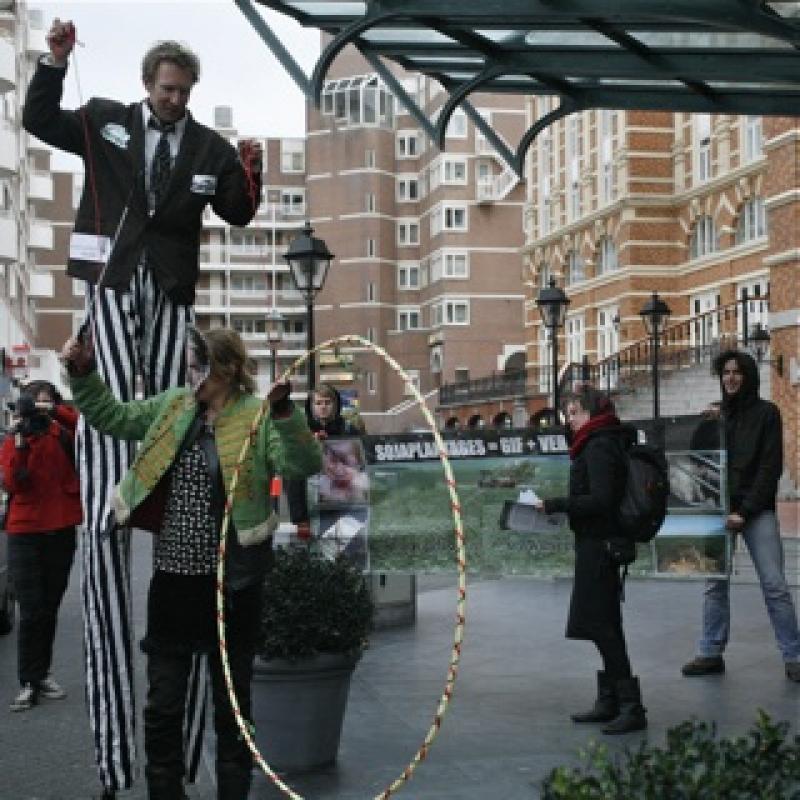
Dutch sidetracking the real issues on GM
The EU’s policy on the cultivation and imports of genetically modified crops, flawed as it may be, is continuously under attack from the food, biotech and agribusiness industries. The animal feed industry, large importers of soy, have been taking a leading role in the current battle to speed up the EU authorisation process for genetically modified organisms (GMOs) and abolish a crucial piece of EU GMO regulation, which forbids any contamination of food with traces of GM crops that are non-authorised in the EU: a zero-tolerance policy.
The animal feed sector in Brussels is represented by lobbygroup FEFAC which argues the process is a barrier to competitiveness. The ‘slow’ GMO authorisation procedure and the zero-tolerance policy, they say, limits the availability of soybeans, maize and oilseed rape imported into the EU, affecting the competitiveness of Europe’s highly resource intensive meat and dairy industries. Some politicians have been convinced by the industry’s arguments, including former Agriculture Commissioner Marianne Fischer Boell and Dutch Agriculture Minister Gerda Verburg.
In late December 2008 the Environment Council decided on the other hand that the socio-economic impacts of GMOs should be taken into account in risk assessments. This seemed to be an opportunity to finally discuss the EU responsibility for the social and economic impacts caused by large scale RoundupReady soy monocultures. But so far, this is not the case.
The Dutch Agriculture Ministry notably twisted the debate to turn it into a push for a review of EU policy precisely to speed up the EU GMO approval process. To this end, it organised a two-day high-level conference about “GMO’s in European Agriculture and Food production”. Ministers, EU officials and industry representatives all spoke about the ‘deadlock’ or the ‘dead end street’ created by the current EU GMO regulation. “The question is not if, but how to use GMO’s”, was another much repeated refrain.
Despite the pro-GM agenda, Hans Herren of the IAASTD made an excellent speech, questioning the need and advantages of GM for agriculture and food production. He pointed out that current GM crops usually lead to an increase of energy-intensive inputs and transport needs, rather than a decrease.
In contrast, the Director General of DG Environment, former trade negotiator Karl Falkenberg (appointed by German Chancellor Angela Merkel) spoke almost nostalgically about his time working for Trade Commissioner Pascal Lamy, and stressing the WTO limitations for socio-economic criteria – the WTO has been shaped by its creators including the EU to forbid such criteria.
The rooms were filled with the old boys’ biotech network, or, as Julien Mousnier of the European Commission said: “many familiar faces”. These included Willy de Greef of EuropaBio, and Garlich von Essen of the European Seeds Association. Von Essen in his presentation described the EU’s GMO policy as detrimental to the industry, with the exception of the EU biotech research subsidies obtained through High Technology Platforms.
The conference organisers clearly had been instructed not to emphasise the evidence of harmful impacts of GM crop production. Corporate Europe Observatory and Toxicsoy.org had been invited to submit a list of suggested speakers on the reality behind RoundupReady soy production, after making contact, but the suggestions were refused.
The conference “should not be focused on soy”, the organisers said. However, there was a session on ‘sustainability frameworks’, with Syngenta and Paraguayan soy producer Grupo DAP talking specifically about ‘responsible’ soy. When CEO raised the lack of support by movements and NGOs for the Round Table on Responsible Soy during the session, the response was that this was the result of ”environmental dogmatism”, which was “not based on facts”. “Refusing to dialogue” was not the solution. There seems to be a (Dutch) monopoly on dialogue that only includes Round Table participants. Overall, the two-day event only included one representative from a Southern NGO, Searice.
In contrast, Guillermo Terol of Grupo DAP, himself admitted the clashing production models (large scale soy production versus small scale food production), the abuse of pesticides and even the disastrous health impacts this has on communities.
CEO and the German organisation Rettet den Regenwald had organised a petition asking the Ministers Verburg and Koenders to withdraw the Dutch government’s financial support for the RTRS. CEO and Toxicsoy.org handed over 10,500 signatories to Minister Verburg during the first day of the conference.
Meanwhile, Dutch Environment Minister Jacqueline Cramer confirmed that the socio-economic impacts would first be considered for GM crops grown in Europe (meaning to focus on the economic impacts of the ‘slow’ authorisation prodedure..). The impacts of imported GM crops would only be considered “later”.
The very last remark, made by an industry representative, repeated the bottom line of this conference: Europe’s ‘autonomy’ in protein production is very low, and sourcing GM free crops or even alternatives grown in Europe will lead to higher costs. Therefore, rules should be changed to guarantee Europe’s factory farms access to resources at cheap price.
Nevermind the socio-economic costs...
Downloads
